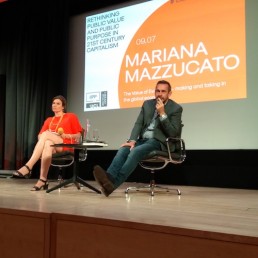British Library, 09-Jul-2018
In 2018 Mariana Mazzucato is a brand name. I first came across her in the short article Wired’s Ideas Bank, which first made me aware that everything I thought I knew about entrepreneurship and innovation was a fallacy, sold to me by corporate sector’s PR and general “hijacking of the narrative”.
The article may have been short, but the Mazzucato’s point was huge. Then there was the lunch with FT, and then the British Library event. Mazzucato’s “the value of everything” lecture was part of the series organized by the British Library and UCL, and was linked to the release of her new book (also titled “the value of everything”) which analyses how (and why) modern economies reward value extraction and rent seeking rather than genuine value creation.
And let me tell you one thing: did she deliver. With passion, confidence, and charisma Mazzucato was one of a couple of speakers whose presentations I attended in the recent weeks who proved that not only *what* you say, but also *how* you say it really, really counts (others were Ruby Wax, Izabella Kaminska and Eugenia Cheng).
The quote the presentation revolved around comes from Big Bill Haywood, who in 1929 set up first trade union, which reads “The barbarous gold barons – they did not find the gold, the did not mine the gold, they did not mill the gold, but by some weird alchemy all the gold belonged to them”.

What I found very interesting was that rather than focus on purely economic arguments (which could lead to the discussion turning academic, niche, and otherwise boring), Mazzucato, originally, provocatively, even somewhat eccentrically, stated how important storytelling and narratives are in this discussion, and how important it is to contest what is told to the public as the official version of events (Mazzucato quoted Plato’s “storytellers rule the world”; by contrast I feel tempted to quote Reagan’s “government is no the solution to our problem; government *is* the problem”; to be clear, I’m siding with Plato).
Financial services sector took the brunt of Mazzucato’s criticism, with modern politics coming a close second. The criticism of financial services ran along the standard lines of productivity and adding value, while modern day liberal politicians and public sectoras a whole were criticised for not countering the neoliberal, neoclassical corporate narrative. Pharma came third for rigging prices of medicines.
In terms of innovative thoughts and ideas, I appreciated Mazzucato joining the ranks of more and more public figures who fight to recognise user-generated data as something that has value in the economic sense, and therefore something its creators should be compensated for (e.g. in the form of UBI).
On the more iconoclastic side, I was in equal measure surprised and happy to hear Mazzucato predicting a boom (and bubble) in cleantech. I’m all for it. I could not be happier to hear it. That’s one bubble I support in full.
One thing I missed throughout the lecture was Mazzucato clearly defining “value”. She was pointing out may dysfunctional aspects of modern economy (casino banking, rigging medicine prices) and constantly referring to what does and doesn’t contribute to value, but never once had she actually defined it. The question came up in the Q&A and Mazzucato defined it fairly loosely as public purpose- / mission-driven actions, such as, for example, cleaning up the oceans. She also said that “value is created collectively”, which stands in contrast to prevailing individualist approach to entrepreneurship and life in general, so that’s definitely food for thought.
You can watch the entire lecture (87 minutes) on YouTube.
